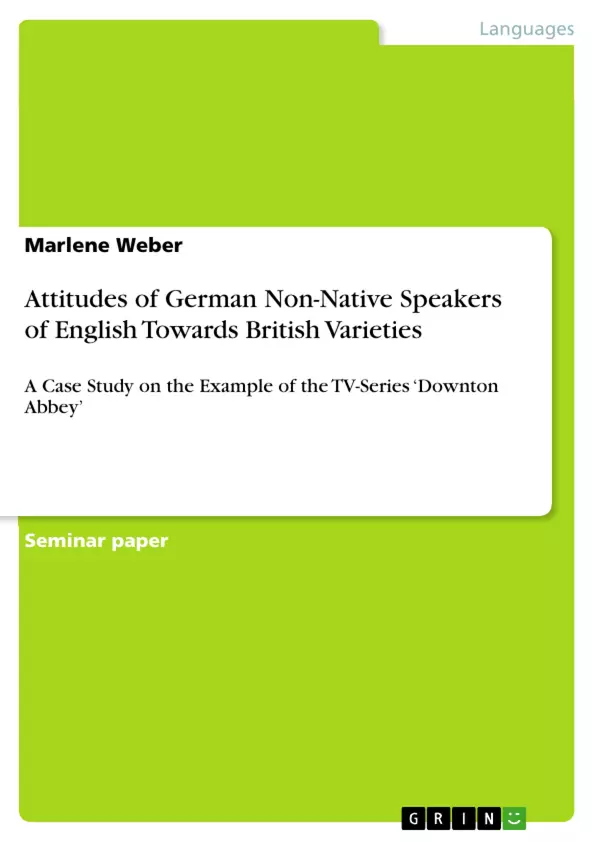The reason to conduct this study lies within the question of how German (and therefore non-native) speakers of English evaluate different ways to speak the English language. How do they judge its speakers to be as a person and is this dependent on the variety he or she speaks? It will be interesting to see whether what way of speech they personally prefer to speak or what kind of education they received influences their judgement of the speech samples presented to them. A lot of research of attitudes towards varieties for the educational sector has been done, but the aim of this paper is rather to show whether this attitude is also influenced by visual stimuli and how non-natives in Germany evaluate the different ways of speaking English, to have an impression of how these attitudes in everyday encounters may look like. Consequently, there are several hypotheses which are to be tested by two questionnaires and with the help of the TV series "Downtown Abbey".
Inhaltsverzeichnis (Table of Contents)
- 1 Introduction
- 2 A Case Study: Background and Conceptual Design
- 3 A Case Study: Data Collection, Analysis and Results
- 4 A Case Study: Discussion of Results and Future Prospects
- 5 References
Zielsetzung und Themenschwerpunkte (Objectives and Key Themes)
This study aims to examine the attitudes of German non-native speakers of English towards British varieties of English, focusing on the impact of visual stimuli and the influence of personal factors on these attitudes. The study uses the popular TV-series 'Downton Abbey' as a case study to explore these attitudes in a real-world context.
- The influence of visual stimuli on attitudes towards varieties of English
- The role of personal factors, such as gender, age, and education, in shaping attitudes
- The perception of Received Pronunciation (RP) and non-standard varieties of English by German non-native speakers
- The comparison of attitudes between two groups of informants: those familiar with the TV-series 'Downton Abbey' and those who are not
- The potential for future research on the topic of attitudes towards varieties of English
Zusammenfassung der Kapitel (Chapter Summaries)
- Chapter 1 Introduction: This chapter provides a brief overview of the topic of attitudes towards varieties of English, defining key terms and outlining the aims and hypotheses of the study. The chapter also introduces the TV-series 'Downton Abbey' as the chosen case study.
- Chapter 2 A Case Study: Background and Conceptual Design: This chapter explores previous research on attitudes towards varieties of English, focusing on studies that have examined the role of visual stimuli and personal factors. It also provides information on the questionnaires and techniques used in the present study.
- Chapter 3 A Case Study: Data Collection, Analysis and Results: This chapter describes the data collection process and the results of the study, analyzing the responses of the two groups of informants and comparing them with each other. It examines the influence of visual stimuli and the role of personal factors in shaping attitudes towards British varieties of English.
Schlüsselwörter (Keywords)
The main keywords and focus topics of this study include attitudes towards varieties of English, visual stimuli, Received Pronunciation (RP), non-standard varieties of English, German non-native speakers, personal factors (gender, age, education), and the TV-series 'Downton Abbey'. This study aims to understand how German non-native speakers of English perceive and evaluate different ways of speaking English, considering the impact of both auditory and visual cues.
Frequently Asked Questions
How do German speakers evaluate British English varieties?
The study examines how non-native speakers judge the personality and social status of a speaker based on whether they use Received Pronunciation (RP) or a non-standard variety.
Does watching "Downton Abbey" influence language attitudes?
The research compares attitudes between people familiar with the series and those who are not, exploring how media consumption shapes perceptions of British accents.
Do visual stimuli affect accent evaluation?
Yes, the study tests the hypothesis that visual cues (like a person's appearance in a TV show) can significantly influence how their way of speaking is judged.
What factors shape these attitudes in non-native speakers?
Personal factors such as gender, age, and the type of English education received play a major role in how German speakers perceive different British varieties.
Is Received Pronunciation (RP) still the preferred variety?
The study investigates whether RP is still viewed as the most prestigious or "correct" form of English among German learners compared to regional accents.
- Citation du texte
- Marlene Weber (Auteur), 2015, Attitudes of German Non-Native Speakers of English Towards British Varieties, Munich, GRIN Verlag, https://www.grin.com/document/307145



